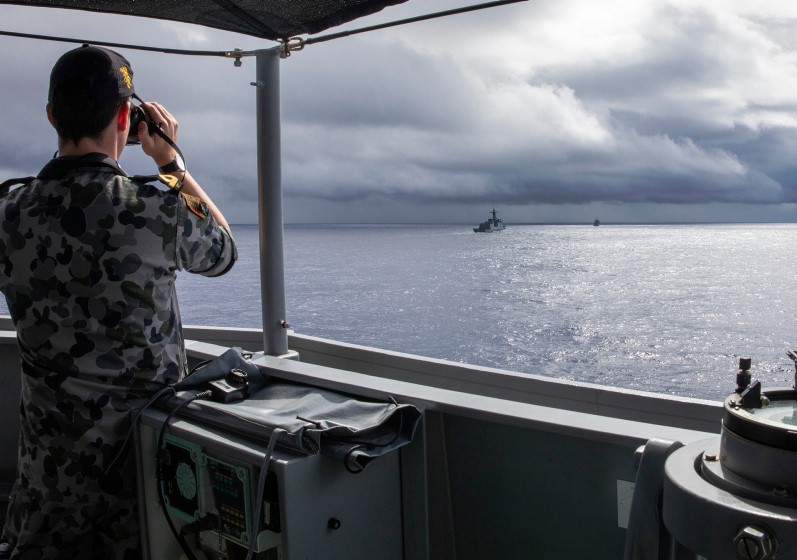New Zealand and US elections mean Australia is looking after ANZUS Pacific interests

Elections in New Zealand and the United States will challenge progress that has been made in the Pacific by ANZUS countries. It looks like New Zealand’s election will see out the populist NZ First party as a coalition partner and bring to a close party leader Winston Peters’ influence on the country’s foreign affairs. In the US, in the midst of electoral turmoil, Australia and New Zealand have made considerable investments in offsetting the chaos of the White House. What happens after the election will determine whether those investments were worthwhile.
As foreign minister, Peters has played a pivotal role in promoting greater attention and resources for Pacific island countries. In March 2018 he announced New Zealand’s ‘Pacific reset’ in a
speech at the Lowy Institute in Sydney. Given that he could have announced the reset in his own capital, the choice of Sydney suggests his intention was likely to pressure Australia into taking action in the Pacific. Then, in November of that year, the Australian government announced its Pacific step-up. Admittedly, the step-up had been foreshadowed in the
2017 foreign policy white paper, but Peters may have forced Canberra’s hand.
In a similar vein, Peters traveled to Washington in December 2018, where he once again
called for action, saying, ‘We unashamedly ask for the United States to engage more and we think it is in your vital interests to do so. And time is of the essence.’ The urgency, of course, came from the strategic competition unfolding between Washington and Beijing.
How the next government under Jacinda Ardern addresses the Pacific islands and strategic competition remains to be seen. Peters and the NZ First party are polling badly at just 2%, according to the 8 October
NewsHub-Reid poll. Given the nature of New Zealand electoral politics, NZ First needs to hit the 5% mark in polling in order to see success. Peters’ party certainly won’t have anything like its current numbers in parliament. The next Labour-led government in Wellington will need to fill the foreign affairs portfolio, and the question remains whether Labour will lead on its own or in a coalition with the Greens. Either outcome could alter how Wellington engages in the Pacific.
The other unknown concerns the election in the US. For all the bedlam in Donald Trump’s White House, one thing is certain: Pacific island countries have received more attention than at any time in recent memory. Washington’s newfound interest in the region hasn’t come about unaided—both New Zealand and Australia have been very active. In April 2019, the Australian embassy in Washington undertook a campaign to promote its activities in the Pacific to members of the US Congress. Ambassador Joe Hockey wrote to members of Congress that Australia’s intention was ‘to be the partner of choice for our Pacific island country neighbours’. He added that Australia’s ‘new measures are highly complementary to the enduring US security presence in the Pacific’. Australia offered that any member of Congress who wanted a briefing on the Pacific would get one.
Three months later, Democratic Congressman Ed Case
announced the formation of a bipartisan Pacific islands caucus, the first of its kind. It has 20 members, a third of whom are also members of the Friends of Australia caucus and two of whom are from the Friends of New Zealand caucus. In July 2020, in an attempt to further cement Washington’s attention to the Pacific, the caucus’s co-chairs and members introduced the Boosting Long-term US Engagement in the Pacific Act, also known as the
BLUE Pacific Act. Australia and New Zealand co-hosted, along with the
United States Association of Former Members of Congress, a virtual meeting announcing the act. The new Australian ambassador, Arthur Sinodinos, moderated the session, which featured several ambassadors from Pacific island nations.
The November election introduces a high degree of uncertainty to US engagement in the Pacific. A Joe Biden victory will create a new set of legislative demands quite apart from the Pacific, and the impact that will have on the islands will remain unclear for some time. The most pressing legislative issue will be funding for the
Compacts of Free Association. A re-elected Trump administration would be been keen to see legislation make its way through Congress. A Biden victory wouldn’t diminish the need for funding, but it could shift the political focus elsewhere. Quite apart from who wins the presidency, a new Congress will be elected.
In the short-term, New Zealand will be distracted as it organises a new government. Washington will be either setting up a new administration or readying to continue the work Trump started. At least for the next few months, look to Australia to be the steadying hand on the ANZUS interest in the Pacific.
 Print This Post
Print This Post